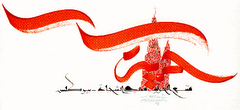Background informationMoatasem was arrested from the family home in the Qalandiya refugee camp, near Ramallah in the West Bank, at 3:00am, on 20 March 2010. He was asleep at the time and woke up to see heavily armed Israeli soldiers in his bedroom.
A soldier immediately tied Moatasem’s hands behind his back without asking for his name. Moatasem was led out of the house and on his way saw that the front door had been broken down. Moatasem asked a soldier if he could put on warm clothes and shoes but was only permitted to put on sandals. He was then blindfolded and led 70 metres to the main road where a number of military vehicles were parked. Moatsem’s blindfold was removed and he was asked for his name and to confirm his identity from a photograph. His blindfold was then replaced and he was put into a military vehicle. At some point during his arrest a soldier insulted Moatasem by saying ‘son of an adultress.’ During his transfer, a soldier ordered Moatasem to place his head on his knees and slapped him every time he tried to sit up. Moatasem recalls that this caused him ‘extreme pain.’ At no time during this process was Moatasem told why he was being arrested, or where he was being taken.
Inadequate clothing and shelterMoatasem was then transported to an unknown location and given a medical form to complete. He was then left tied up outside between two shipping containers. At some point in the night, Moatasem heard the sound of a weapon being cocked close by, followed by laughter. Moatasem recalls ‘it was very cold and I was shivering. The soldier who arrested me didn’t allow me to put on warm clothes. The entire time I was sitting there I kept hearing dogs and soldiers. In the morning a soldier brought a blanket and covered me with it when I was about to freeze.’ At around 2pm in the afternoon, Moatasem was placed in another military vehicle and transferred to Ofer Prison, near Ramallah.
Strip searched and detained with adults On arrival at Ofer Prison, Moatasem was strip searched and ordered to sit naked on the ground until he was given a brown prison uniform. He does not know why. He was then taken to a cell containing adults and children, where he remained for three days. Sometime later Moatasem was placed in a vehicle and taken to Binyamin police station for interrogation
Interrogation Moatasem waited to be interrogated at Binyamin police station, from 8:30am until 2:00pm. During this time his hands and feet were shackled. At 2:00pm he was taken into an interrogation room and kept tied and shackled the whole time. Moatasem recalls his interrogation as follows: ‘I sat in the chair in the interrogation room while my hands and feet were still shackled. Then, the interrogator started asking me about the plot without explaining what the plot was. “I don’t know what you’re talking about,” I said to him and he asked me about the riot, bullets and weapons without giving any further explanation. I denied knowledge because I really didn’t know what he was talking about and I really had nothing to do with those things. Then, he asked me about the internet and a guy named Mohammad from Gaza I chat with. I told him I didn’t know Mohammad that well. I met him in some chat room and we talk about school and tests and so on. “Liar,” the interrogator said to me and kept focusing on asking me about this guy.’ The interrogator then threatened to send Moatasem to Al Mascobiyya interrogation and detention centre, a place notorious for its interrogations. The interrogator then handed him a handwritten paper to sign, but Moatasem refused as he could not read the writing.
Administration detention order Moatasem was then sent back to Ofer Prison, and on 25 March 2010, was handed an administrative detention order for six months. Moatasem was taken to Ofer Military Court on 1 April, and the Court confirmed the order. Moatasem’s administrative detention order is dated to expire on 27 September 2010.
Administrative detentionAdministrative detention is detention without charge or trial and is often based on ‘secret evidence.’ Israeli Military Order 1591 empowers military commanders to detain Palestinians, including children as young as 12, for up to six months if they have ‘reasonable grounds to presume that the security of the area or public security require the detention.’ The initial six month period can be extended by additional six-month periods indefinitely. This procedure denies the detainee the right to a fair trial and the ability to adequately challenge the basis of his or her detention.
Moatasem and another boy are the first children to receive Israeli administrative detention orders since November 2009. There are currently at least 237 Palestinians being held by Israel without charge or trial in administrative detention. For more information visit the DCI-Palestine website at
Freedom Now.
Recommended actionThe detention of a child in these circumstances does not conform to Israel’s obligations under the UN Convention on the Rights of the Child or the UN Convention Against Torture and Other Cruel, Inhuman or Degrading Treatment or Punishment. Please send Urgent Appeals urging:
- An immediate end to the practice of detaining persons under 18 years in administrative detention.
- Immediately and unconditionally release Moatasem Nazzal from administrative detention, or charge him with a recognisable criminal offence and promptly try him in a proper court of law with internationally accepted standards for a fair trial.
Appeals to: Please inform
DCI-Palestine if you receive any response to your appeals and quote the UA number at the top of this document.



Aucun commentaire:
Enregistrer un commentaire